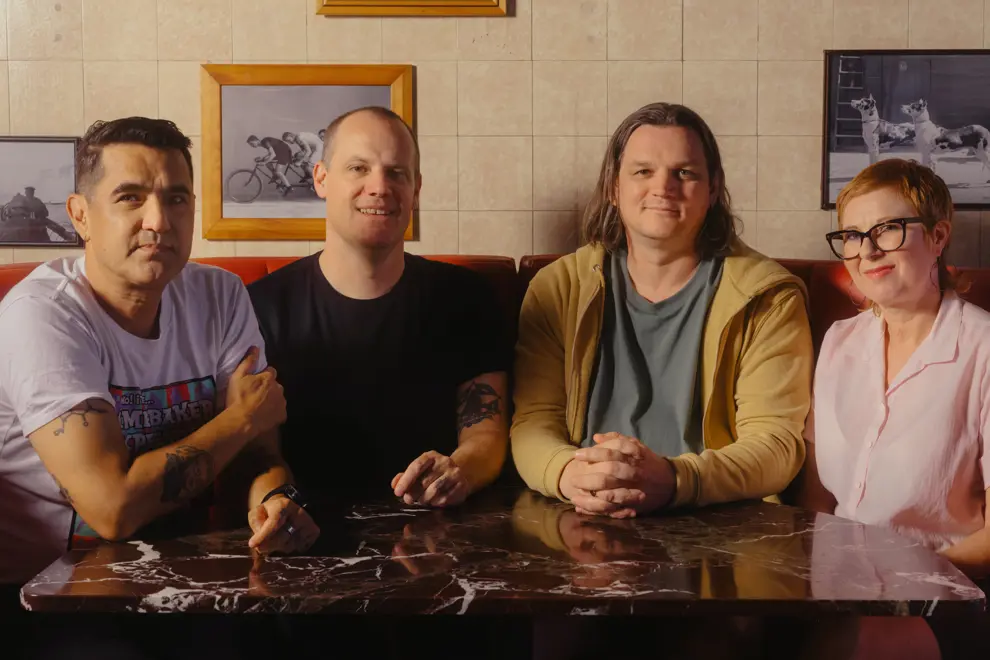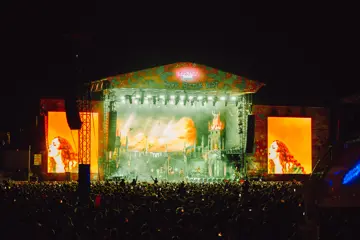When growing up in Dublin, Fran Daly played in bands, managed them, and at 15, ran his first festival.
“A flatbed truck and a field, everyone had a good time,” he recounts.
At 21, he left for a new life in Australia, stopping over in a Southeast Asia sojourn while he worked out his next reel.
When he arrived in Sydney, the live scene was booming. Venues were filled, showcasing four diverse acts a night.
He was swept up and soon ran the Gaelic Theatre in Surry Hills, voted Best Live Music Venue - NSW at the 2007 Jack Awards.
Open until 4 am, seven nights a week, it had space for 800 punters (later 500) to pump it out for local and overseas music, comedy, burlesque, and dance and fashion parties.
In 2005, Gary Óg, from Scotland, a leading figure in Irish rebel folk music in Scotland, Ireland and the US, wanted to raise his profile in Australia.
“But I don’t have any representation here,” he told Daly after a massive show where The Gaelic almost ran out of beer that night.
That conversation led to the formation of tour promoter Troubadour Presents. “In the past, playing in bands, managing and running festivals, and now running a music venue, all along I was training for something like this,” Daly remembers.
“Right from the start, I wanted to work with musicians I was a fan of. I was heavily influenced by my old brother’s record collection, as most of us are.”
The initial wish list had Sinead O’Connor, Paul Weller and Damien Dempsey, an Irish singer-songwriter heavy on social and political commentaries and signed to ABC Music.
Don't miss a beat with our FREE daily newsletter
All three toured for the young company. O’Connor took five years to nail down. He got her for her final Australian tour in 2015. She died in 2023, aged 56.
“Securing her for this region was difficult; she didn’t tour internationally all that much. But we managed to get two festivals, WOMADelaide (South Australia) and Port Fairy Folk (Victoria), and the Sydney Opera House came on board. Those were key to convincing Sinead’s management to come.”
Her image was she could be difficult. The opposite proved to be true.
“It was a truly amazing experience. I travelled everywhere with her. Sinead was such a professional. Everything had to run on time. The soundchecks were long and laborious, whereas, with some other bands, the main person wouldn’t even turn up.
“I found her to be very funny, very witty, very engaging. Her backstage rider was very basic. She’d take a couple of hours to unwind before she emerged to meet the public and the crew because so much went into the performance.
“When singing, she’d be so lost in the moment. You’d see it in her face or eyes; she was somewhere else when performing. Like a boxer who’d gone 12 rounds.”
Early Days
In the early days, Daly learned by watching and getting advice from Australian promoters like Dave Batty of Custom-Made and Tim Pittman of Feel Presents, who had a high strike rate because of their understanding of audiences and developing international contacts.
He also travels abroad consistently, looking for new blood. He’s already made two trips in 2025.
Troubadour has toured over 100 artists, including those from the UK and Irish folk, protest and rebel areas, such as Mary Black, Ralph McTell, Kevin Crawford and Lloyd Cole, from UK country (Alabama 3), US punk (Superchunk), and metal merchants including Canada’s Devin Townsend and New Zealand’s Alien Weaponry.
The diversity stems from the fact that “Irish music in Ireland is not called Irish music, it’s called music.”
He finds that folk music has as much pace and heaviness as metal. “Ireland’s not far from Scandinavia, so it shares long dark days, which gives us a love for indoor entertainment, alcohol and heavy music!
“Irish rap is exploding; it's always in the culture of storytelling and spoken word.”
Celebrating 20 years, Daly is one toke over the line. The company has an audience that turns up to every show. It’s similar to the behaviour of rabid UK soccer fans like himself.
The team is small but punchy. Head of Marketing & Operations Basil Cook joined last August after a long stint as Senior Label Manager at ABC Music.
Head of Touring Adam Yee booked Sydney’s The Golden Barley and was a Senior Event Producer at the Sydney Reclink Cup. Bookkeeper Emily Butler has a background at Love Police and Chugg/Frontier.
Through the touring arm, the 15-year-old management division focused on building up overseas and local acts.
A prime example was Dublin band The Coronas, who met at school at 15 and released their first album, Heroes Or Ghosts, in October 2007. On their first visit, they had no radio airplay, and he could only get them into 150—200-capacity rooms.
“You rely on word-of-mouth, you choose the right venues so you walk before you run, and you work with publicists who can take the act on a journey and get them in the right media.
“You get them to commit to keep coming to this market even when it’s not their primary market.”
Through return visits, The Coronas picked up radio support and sold out 1,000-capacity rooms, and the band’s Danny O’Reilly is full of praise.
“They’re always a pleasure to deal with,” he relays. “They got on board with us early and shared our long-term vision of building up the band's Australian audience.
“The approach paid off, with recent tours seeing the band sell out venues in Perth, Melbourne and Sydney.”
Sydney folk punk Rumjacks, whom he managed in the early days, went on to tour abroad and had one of their songs generate 100 million YouTube views.
The Gathering have three albums through ABC For Kids, while Tamworth-born Brisbane-based alt-country performer Paddy McHugh is dropping his third album this year.
McHugh, who’s been a management client for ten years, says, “Under their guidance, I have toured Australia, New Zealand, the Middle East and Europe, crowdfunded $19k to record my debut studio album, and recorded two albums for ABC Kids Music, which boosted my streaming numbers tenfold.
“Troubadour has the best interests of artists at heart. I’ve seen them go above and beyond in support of artists with professionalism, loyalty and the craic!”
Remaining Independent
Asked how hard it is to remain an independent music company without any kind of funding, Daly sighs.
“I don't want to sound like I’m playing the tiniest violin in the world, but it’s one of the hardest things I’ve ever had to do in my life.
“A lot of my friends have got ‘grown up jobs’ in established festivals or work for someone else and let them take the risks.
“I’m not a gambler by nature, but promoting forces you into that. The hardest is the financial side. Once you have the knowledge and the contacts, you vie for an act. The agent’s job, of course, is to get the best price. But how exposed do you leave yourself?
“How vulnerable do you leave your business, and your crew and a good team? You always have it in the back of your head [that] you are responsible for people’s livelihoods.
“That is a whole new dimension. Promoters want to put on a show because they love the music. I can think, offhand, half a dozen or so promoters who lost everything and had to rebuild again because they put their own finances into a tour.
“It’s crazy, but when you scale up a bit, and you have more expenses and overheads, and you have to feed that machine a bit, you have to take on the bigger boys, [and] you start to take more risks. You have to compete more ferociously.”
Around the time of COVID, when Australian independents were at their most vulnerable, many were taken over or merged with larger plays to give themselves more muscle. ”That makes it harder for us to compete and survive,” says Daly.
Troubadour Presents had such an offer. Discussions were at an advanced stage, but at the last minute, some of the team decided it wasn’t for them.
Through 2025’s celebrations, more tours are booked, the management company is expanding its services, and there are plans to set up an independent record label that will allow Troubadour to support artists in new ways.
“We have a distribution deal in place, and it’s ready to go. We’re just waiting for the first acts to sign on. We’re in advanced talks with acts we work with.
“We want to do it right; we want to begin with catalogues of previously recorded material by these acts. When the time is right, we will launch.”
















